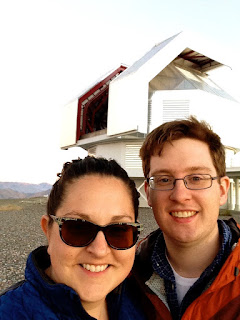The AAS Committee on the Status of Women in Astronomy is compiling interviews highlighting the diversity of career trajectories available to astronomers. The interviews share advice and lessons learned from individuals on those paths.
Below is our interview with Gwen Rudie. She studies the chemical and physical properties of very distant galaxies and their surrounding gas in order to further our understanding of the processes that are central to the formation and development of galaxies. Critical to this research is our ability to trace the raw materials of galaxy formation and its biproducts. These clues can be found in the gas that surrounds early galaxies. She is primarily an observational astronomer, working on the analysis and interpretation of high-resolution spectroscopy of distant quasars as well as near-infrared and optical spectroscopy of high-redshift galaxies. In addition to her scientific efforts, she is also the director of the undergraduate research program at the Carnegie Observatories. Dr. Rudie received her AB from Dartmouth College and her PhD from Caltech. She was the Carnegie Princeton Postdoctoral Fellow before becoming a Staff Astronomer.To access our previous Career Profiles, please go to http://womeninastronomy.blogspot.com/search/label/career%20profiles
What field do you currently work in?
I study high-redshift galaxies and the circumgalactic medium and am one of the project scientists for a new NIR instrument concept for the Magellan telescope. I also run Carnegie’s summer undergraduate research program, CASSI, and serve on Carnegie’s institutional diversity, equity, and inclusion committee.
What is the job title for your current position?
Staff Astronomer
What is the name of your company/organization/institution?
Carnegie Observatories
What city, state, and country do you live in? Work in?
Pasadena, CA
What is the highest degree in astronomy/physics you have received?
PhD in astrophysics from Caltech
What has been your career path since you completed your degree?
I was a Carnegie-Princeton postdoctoral fellow at Carnegie from 2013 - 2015 and joined the Carnegie scientific staff in 2015.
 |
| Dr. Rudie and her husband at the telescopes at LCO. |
I still do scientific research, so general training in astronomy has been critical to my career. But practice giving scientific talks was important for being ready to give presentations at conferences and the job talks needed to secure a permanent position. I also served as the graduate student representative to the faculty when I was a student at Caltech, and I still use some of the lessons I learned about leadership, open communication, and diplomacy from that position.
What are the most enjoyable aspects of your job?
Some of my favorite things about my job are: designing research programs and the observations needed for them - even slit masks!, working with my group members and colleagues, mentoring postdocs and students, and running the Carnegie summer undergraduate program. I’m really enjoying working on MIRMOS, a new instrument we are planning for Magellan. I particularly like the collaborative and “human” aspect of getting science done and really enjoy working with teams of people to accomplish a goal - be it a scientific measurement or some DEI initiative or the summer program.
What do you like most about your working environment?
As with many, I am currently working from home. The benefit of this is I get to see my 15-month-old son at lunch every day and don’t have to waste time commuting!
How satisfied are you with your work-life balance in your current job?
This year has been a really hard year for work-life balance and having a sane life in general. Working from home and the constant anxiety of the pandemic make focusing on long-range programs a lot harder. Also, my husband and I welcomed our son in Sept 2019, so balancing a baby plus a demanding career is daunting. I try to take it one day at a time and focus on supporting my community - including my professional community (like students and postdocs) as well as my friends and family.
 |
| Dr. Rudie and her son. |
It’s a mix. I have a tremendous amount of control over my daily schedule and a lot of flexibility about when I do things and what I prioritize. The issue is only how many things need to get done in a given day or week. This year, I have prioritized spending time with my son while he is little, so I am pretty conscientious about ending work at 5PM to be with him until he goes to bed. Some days, that means I go back to work after he is asleep, but I really value that I have time every day to check in with him and see how fast he is learning new things.
What advice do you have for achieving work-life balance (including having a family)?
It’s easy to give advice and hard to take it. So I think from my perspective, the things that are most effective are (1) evaluating what is most important to you right now (both in your life and your job) and prioritizing those things and (2) asking for help when you need it. I’m not actually great at either, but I’m trying to be better about them all the time.
What do you do for fun (e.g., hobbies, pastimes, etc.)?
I love to travel, spend time with friends, and try new food and drinks. I also really love paper crafts and enjoy gardening, cooking, and walking with my husband and/or son. A lot of my main hobbies though have been replaced with reading board books and playing with trucks with my son. Not the hobbies I’d pick for myself, but done with him, they are a lot more fun!
Can we include your email address for people who may want to contact you directly about your specific career route?
Sure: gwen_at_carnegiescience.edu

No comments :
Post a Comment